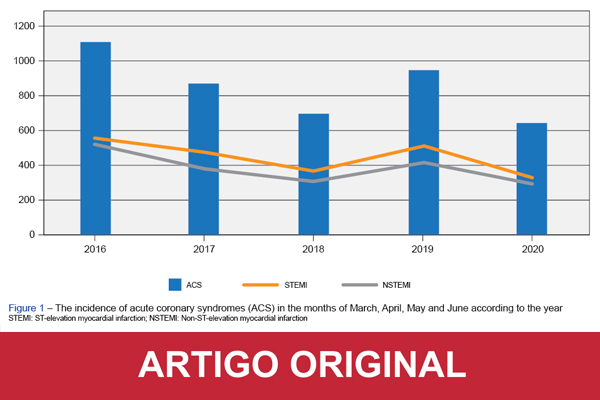SOCIAL MEDIA
Portuguese Medical Association's Scientific Journal

Introduction: Severe acute respiratory syndrome coronavirus 2 (SARS-CoV-2) led to changes in healthcare institutions and medical assistance. Non-SARS-CoV-2 related diseases were indirectly affected by the pandemic. Nonetheless, their treatment remains crucial. Cardiovascular conditions such as acute coronary syndrome (ACS) are common, and it was necessary to adjust medical assistance to these diseases during the pandemic. This study aimed to assess the national impact and healthcare system response during the first wave of the pandemic in patients admitted for ACS.
Material and Methods: Multicenter retrospective study based on the Acute Coronary Syndrome Portuguese National Registry between the 1st January 2016 and the 28th February 2021. Two groups were defined: the previous year to the SARS-CoV-2 pandemic (March, April, May and June 2019) (952 patients) and the first wave of the pandemic (March, April, May and June 2020) (642 patients). Clinical course, time until reperfusion, in-hospital outcomes and follow-up at one year were compared between both periods.
Results: There was a lower incidence of ACS between March and June 2020 compared with the same period in 2019, with a reduction of 32.6%. There were no statistically significant differences between the two periods regarding patient demographic characteristics (except for a higher prevalence of familiar cardi vascular history and chronic obstructive pulmonary disease in 2020 and higher prevalence of diabetes in 2019), clinical features, clinical management, in-hospital major adverse cardiac events, mortality and readmission at one-year follow-up. There was a trend towards longer delays until reperfusion, yet without statistical significance. The patients that developed ACS during the first wave of the SARS-CoV-2 pandemic were less often referred to percutaneous coronary intervention centers (p = 0.034) and were more frequently transferred to another hospital (p < 0.001).
Conclusion: During the first wave of the SARS-CoV-2 pandemic there was a nationwide reduction in demand of healthcare services due to ACS events. Even though the Portuguese healthcare system was under strain and forced to divert resources and medical assistance towards the pandemic management, it was capable of responding adequately to ACS.